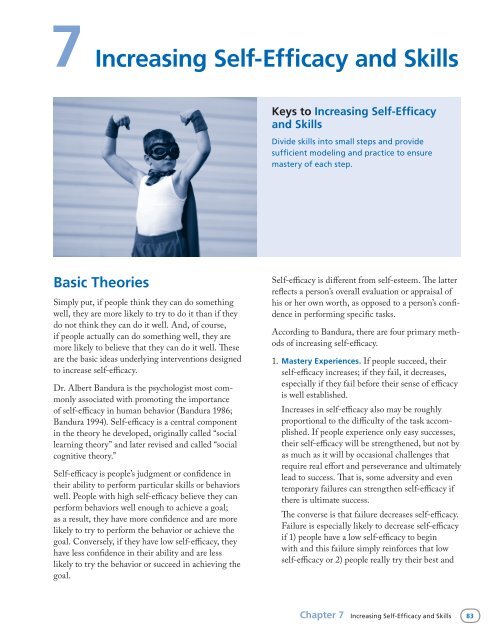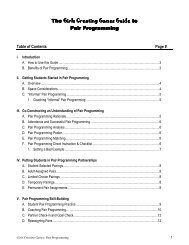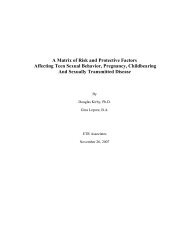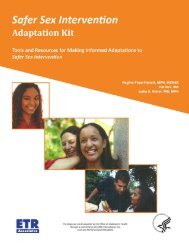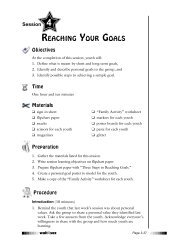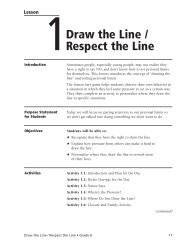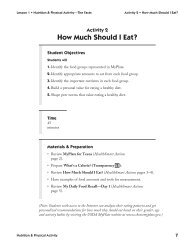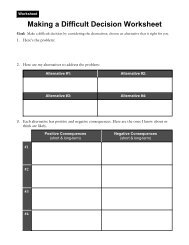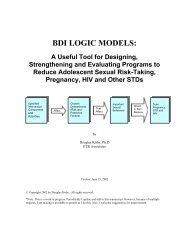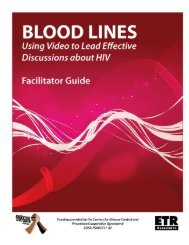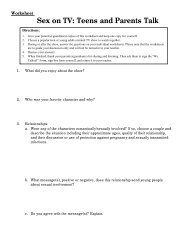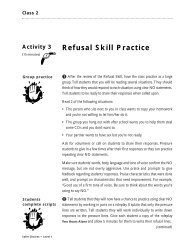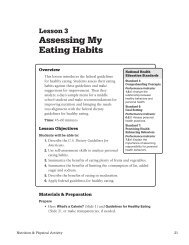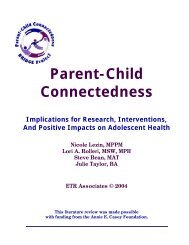Reducing Adolescent Sexual Risk: A Theoretical - ETR Associates
Reducing Adolescent Sexual Risk: A Theoretical - ETR Associates
Reducing Adolescent Sexual Risk: A Theoretical - ETR Associates
- No tags were found...
Create successful ePaper yourself
Turn your PDF publications into a flip-book with our unique Google optimized e-Paper software.
7 Increasing Self-Efficacy and SkillsKeys to Increasing Self-Efficacyand SkillsDivide skills into small steps and providesufficient modeling and practice to ensuremastery of each step.Basic TheoriesSimply put, if people think they can do somethingwell, they are more likely to try to do it than if theydo not think they can do it well. And, of course,if people actually can do something well, they aremore likely to believe that they can do it well. Theseare the basic ideas underlying interventions designedto increase self-efficacy.Dr. Albert Bandura is the psychologist most commonlyassociated with promoting the importanceof self-efficacy in human behavior (Bandura 1986;Bandura 1994). Self-efficacy is a central componentin the theory he developed, originally called “sociallearning theory” and later revised and called “socialcognitive theory.”Self-efficacy is people’s judgment or confidence intheir ability to perform particular skills or behaviorswell. People with high self-efficacy believe they canperform behaviors well enough to achieve a goal;as a result, they have more confidence and are morelikely to try to perform the behavior or achieve thegoal. Conversely, if they have low self-efficacy, theyhave less confidence in their ability and are lesslikely to try the behavior or succeed in achieving thegoal.Self-efficacy is different from self-esteem. The latterreflects a person’s overall evaluation or appraisal ofhis or her own worth, as opposed to a person’s confidencein performing specific tasks.According to Bandura, there are four primary methodsof increasing self-efficacy.1. Mastery Experiences. If people succeed, theirself-efficacy increases; if they fail, it decreases,especially if they fail before their sense of efficacyis well established.Increases in self-efficacy also may be roughlyproportional to the difficulty of the task accomplished.If people experience only easy successes,their self-efficacy will be strengthened, but not byas much as it will by occasional challenges thatrequire real effort and perseverance and ultimatelylead to success. That is, some adversity and eventemporary failures can strengthen self-efficacy ifthere is ultimate success.The converse is that failure decreases self-efficacy.Failure is especially likely to decrease self-efficacyif 1) people have a low self-efficacy to beginwith and this failure simply reinforces that lowself-efficacy or 2) people really try their best andChapter 7 Increasing Self-Efficacy and Skills 83


